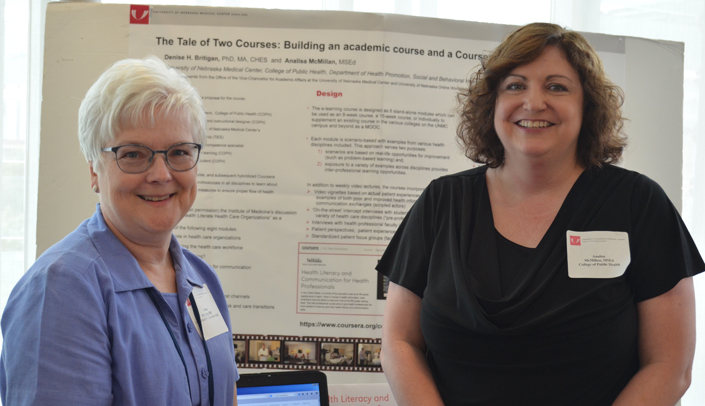She can see the end from here.
This month, Denise Britigan, Ph.D., will close the book on the University of Nebraska’s first Massive Open Online Course (MOOC). A team led by Dr. Britigan and instructional designer Analisa McMillan created the MOOC from scratch earlier this year.
The first iteration of the course, “Health Literacy and Communication for Health Professionals,” included eight modules that featured quizzes, projects and online discussion postings, and it was as much a learning experience for its creators as for the more than 10,000 people enrolled. The MOOC started in October and will end later this month.
By the numbers
Total students: 10,017
Countries represented: 178
Professions represented: More than 70
“First, definitely incorporate an instructional designer,” Dr. Britigan said. “I would not attempt this again otherwise.” She praised McMillan for helping make the MOOC content easily accessible to many users.
The purpose of the MOOC, Dr. Britigan said, was to invite anybody to the table who wanted to be a part of the conversation. The MOOC — with more than 70 professions enrolled — provided an opportunity for physicians, nurses, patients, radiologists, pharmacists and others to engage in disucssion.
“How often can you say ‘I saw a scenario, I posted my input about how I thought it could be improved, and I saw a perspective from all of these different people’?” Dr. Britigan asked.
Discussion board posts, which were not mandatory, showed the level of engagement in the course.
“There’s a lot of peer-to-peer interaction and learning going on from very different viewpoints,” McMillan said. “I think the MOOC has a higher range of peer-to-peer learning, because you have such a diverse amount of peers as opposed to what you’d have in a typical, traditional classroom. We have students from 178 different countries, so that right there brings in a lot of perspective.”
For example, one post asked about barriers to health care access.
“Some listed ‘war,'” Dr. Britigan said. “In this country, I’ve never seen ‘war’ on that list. It really brought home to me what some of these students are dealing with.”
Dr. Britigan and McMillan plan to report on the results of the experience through symposia and publications.
“We hope to present together on lessons learned, what this MOOC taught us and what the takeaway was,” Dr. Britigan said. “I think more entities across the University of Nebraska system will be looking at this option, and we want to share our experience.”
And, after nearly completing the MOOC, Dr. Britigan is willing to try it again.
“The feedback from the involved students has been very positive,” she said. (See sidebar.) “From week one, I felt it was a success.”

Congratulations, Denise!!
This is awesome! Thanks Dr. B and Analisa for sharing this article, and early congrats on teaching your first MOOC!
Great article – congratulations to you both!